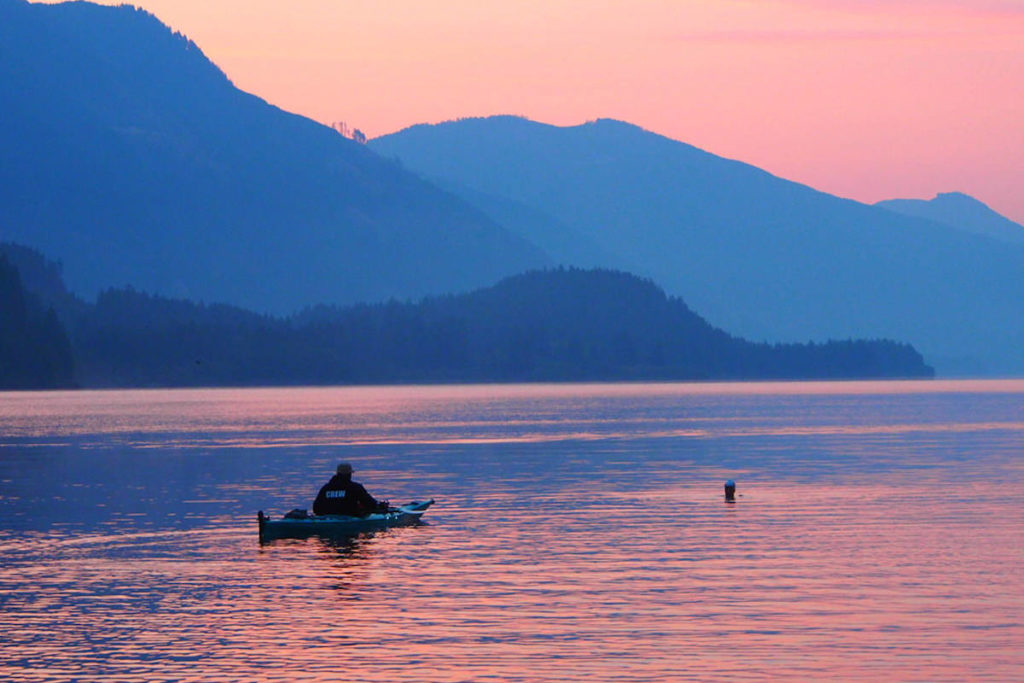By Paul Bucci / Special to Black Press Media
It’s nighttime at Cowichan Lake and Susan Simmons is about to enter the dark, cold water, aiming to conquer her fear about swimming in blackness — that feeling of disorientation and nausea when the black water and sky meld into one.
On shore stands her partner, Ray Este, holding a flashlight, trying to figure out the best way to illuminate Susan’s way, watching her as she swims deeper into the night.
There’s a steadfast determination to this, for Ray and Susan know why they’re here.
In just a few short weeks Susan — ultramarathon swimmer, coach, paddler and MS athlete — will be attempting to swim from Victoria to Port Angeles and back again.
The swim will take at least 24 hours, which means Simmons will at some point be between the U.S. and Canada, swimming in the black of night, in the wild open waters of the Strait of Juan de Fuca.
“You can get pretty disoriented in the water and I tend to get really sick at night,” Simmons says later, discussing her training. “My stomach gets really upset because I lose my sense of where I am in the water.“
You have to be tough-minded to be an ultramarathon swimmer, and for Simmons, who battles MS, the war is both physical and psychological.
The training schedule is grueling: Weights twice a week, spin cycle twice a week, lake swims, pool swims, ocean swims — a minimum of 15 hours of swimming alone per week.
For Simmons, part of ultramarathon swimming is simply problem solving. How do you swim in pitch blackness? How do you deal with cold water? How do you deal with the overwhelming distance? How do you deal with the urge to quit?
“I work on psychological stuff throughout the year,” Simmons says. “I give myself these insane challenges during workouts, where I want to quit, but I know if I go 10 minutes more, I’ll get past it.”
Simmons is a traditional swimmer, which means she wears nothing but a swimsuit, swim cap and goggles, and accepts no aid other than nourishment from her support crew. Last year, she became the 7th swimmer to have ever crossed the Strait of Juan de Fuca from Port Angeles to Victoria without assistance of a wetsuit. Around Aug. 1, depending on the weather, she plans to be the first person to ever cross the strait twice.
She understands cold water. In fact, earlier this year she spent six hours swimming in 10C water as part of an annual swim through the Great Bear Rainforest. The truth is, it is never easy. It is just one more barrier to push past.
“When I first enter the water, I’m like everybody else and it hurts,” Simmons says. “But I know that after 20 minutes, I’ll feel warm.”
Part of Simmons’ strength comes from community. She’s a beloved coach to Special Olympic athletes, who she trains after her own training is done. And she has a three-year plan to have a team swim across the English Channel.
As for other psychological factors, she knows that bumping into even a piece of seaweed in the dark is potentially terrifying. So, how about whales or jellyfish or seals and other creatures?
A Grade 3 class at Sangster Elementary School took on a research project, spending months looking into hazards.
Transient killer whales? “They feed along the shore at dawn or dusk. I won’t be there then.”
Lion’s Mane Jellyfish? “They’re not sitting at the surface in cold water.”
And so it goes, one problem after another, until we get to two issues that are so intertwined that it would be a disservice to separate them. It’s a combination of MS and willpower.
About 25 years ago Simmons was diagnosed with Multiple Sclerosis (MS), an unpredictable and disabling disease, often characterised by fatigue, motor weakness, spasticity, and poor balance.
“When I was first diagnosed, I was told don’t exercise. I basically was sent home to die,” Simmons says. “Just disappear. We don’t want to see you cry. Go be sick.”
Simmons spent the first 10 years basically hiding from the disease, working at home and not exercising. She felt terrible.
Then she decided to do two things: Start swimming (cold water helps with her MS symptoms) and become a vegan.
“You need to be physically healthy,” Simmons says. “You need to have a good diet and nutrition plan and you need to take care of your spiritual side. That’s not what we’re told.”
Simmons started swimming, slowly building up her endurance to where she is today — able to swim vast distances through cold oceans and frigid lakes, overcoming one problem after another.
“The other thing I do,” Simmons says, considering her words carefully before continuing. “I think it’s important to build your, um, willpower muscle.
“I challenge myself all the time. There’s always something that’s just a bit further than I might want to go and I make myself do it.”
As for night-time swims? Simmons and her husband figured out that the best place to shine a light is just on her back, near her shoulder. She’s still practising night swims, but now they’re in the ocean, often off Oak Bay near Victoria.
“It’s actually quite beautiful and peaceful,” Simmons says. “I just follow my arms through the water.”
Susan Simmons has three potential ‘windows’ to swim from Victoria to Port Angeles and back; Aug. 1, 2; Aug. 18 ,19 and Sept. 1.
Talk to us
> Give us your news tips.
> Send us a letter to the editor.
> More Herald contact information.


























